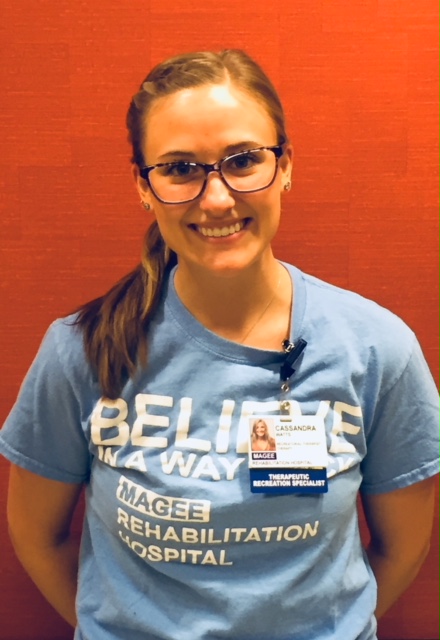February is Recreation Therapy month. In honor of that, we’d like to introduce you to one of Magee’s resident Recreation Therapists: meet Cassandra Watts, MS, CTRS!
How would you describe your job to someone that doesn’t know anything about Recreation Therapy?
Oftentimes people can get some sense of the definition of Recreation Therapy just from its name, but in my opinion, Recreation Therapy encompasses much more than exploring a patient’s “recreation” interests.
Recreation Therapy can mean different things to different people and can be practiced very differently in various settings, whether it’s a hospital, community or adult day care, to name a few. Recreation therapy can be used as a tool to reach specific patient goals or it can be explored to promote quality of life.
Overall, recreation therapists aim to address an individual’s needs with a holistic approach – through cognitive, physical, emotional, social and spiritual avenues. Specific to the inpatient rehabilitation setting, we work with individuals to develop new ways to engage them in leisure activities after sustaining an injury, whether it be a stroke, traumatic brain injury or spinal cord injury. We not only incorporate one’s leisure interests into therapy, but we may also introduce the patient to new activities, technology and assist them in acquiring new hobbies.
Additionally, we work closely with other disciplines to explore community reintegration resources and skills in order to help prepare an individual for discharge from the inpatient hospital.
Why did you decide to become a Recreation Therapist?
Throughout my undergraduate degree, I studied general exercise science and was truly excited about becoming a therapist. However, I was never fully sure about what type of therapy was right for me. I knew I wanted to work with people who have disabilities, but each avenue of therapy (that I knew of at the time) just wasn’t quite right. I always thought, “Well, maybe I can commit to this career, get some experience and then take it down a more creative path.” I didn’t know how I could make my love for dance and various other hobbies fit into a career.
It wasn’t until I was applying to graduate schools that I discovered recreation therapy. At that moment, all the light bulbs went off. As I became incredibly excited by the possibility of a future in this career, that program suddenly shot to the top of my graduate school list.
Although I needed no more convincing, there were personal experiences which solidified this path for me. Around the same time, my grandfather, who had Parkinson’s disease for most of his older adult life, was participating in therapy in order to improve his balance, coordination and overall well-being. Luckily, I was able to attend a therapy session while visiting one spring and, to my surprise, my grandfather was participating in an adapted dance class facilitated by a recreation therapist!
What is the most exciting part of your job?
The best part of my job is the discoveries: the discovery of new ways to adapt various leisure activities given each patient’s unique interests and abilities. It is most exciting to take a step back and see someone get back to doing the things they love in the face life-changing circumstances.
In addition, this is truly a career of lifelong learning. Every day I have the opportunity to learn new skills, ideas and techniques from interdisciplinary team members, fellow recreation therapists and the patients themselves.
Do you have a particular experience or patient that made an impact on your life?
Through my volunteer and work experiences, I have met some truly inspiring people. I have had the honor to work with many individuals with varying abilities, experiences and backgrounds. However, a few patients stick out in my mind.
The quality [the patients] all had in common is positive perseverance. I say “positive” because these individuals not only worked through their challenges, but spread positivity while doing it. Regardless of the hardships they faced, they consistently maintained a positive outlook on life and were motivating and inspiring to those around them, patients and staff included.
Thanks, Cassandra! We’re very lucky to have you on Team Magee!





